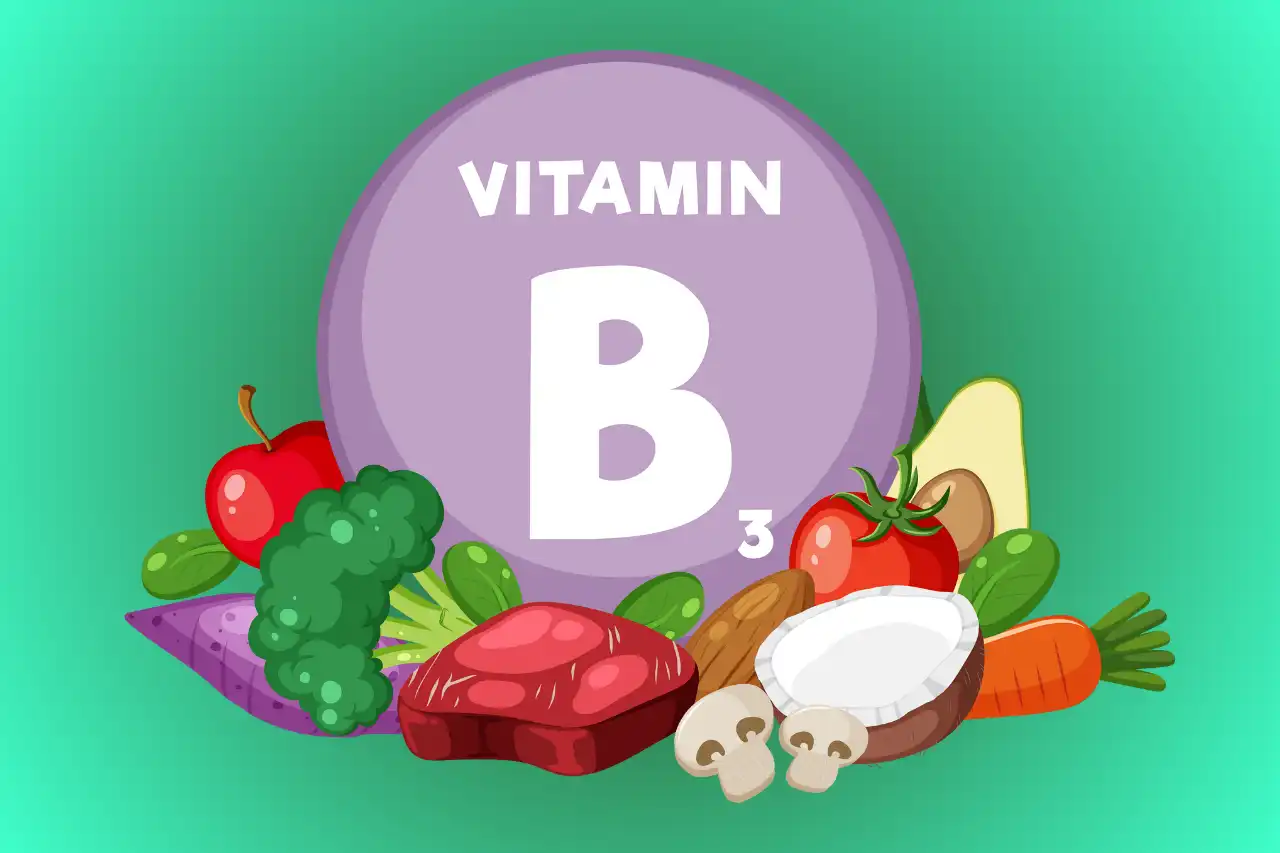-: VITAMIN – B3 :-
Vitamin B3: The Energy & Skin Supercharger…!!!
Vitamin B3, also known as Niacin or nicotinic acid—often called the “Metabolism Booster” for its essential role in converting food into energy.
It has 2 other forms—
Niacinamide (nicotinamide) and Inositol hexanicotinate, which has different effects from niacin.
Daily Requirements
Men
- Teens (9-18 years) – (12-16 mg) per day
- Men 18+ years – 16 mg per day
Women
- Women – 14 mg per day
- Pregnant women – 18 mg per day
- Breastfeeding Mother – 17 mg per day
Children
- Infants (0-6 months) :- 2 mg per day
- Children (1-8 years) :- (6-8 mg) per day
Function on different Organ
- Brain & Nervous System
Details
Vitamin B3 supports memory function, improves your mood, and reduces the risk of cognitive decline.
- Skin & Hair
Details
It helps in maintaining your healthy skin, reduces acne, and thus prevents your premature aging.
- Heart & Cholesterol
Details
This Vitamin B3 is also helpful in lowering your bad cholesterol (LDL), boosts your good cholesterol (HDL), reduces triglyceride levels thus it reduces the risk of heart disease.It is also effective in reducing blood pressure level.
- Liver Health
Details
It helps to detoxify the harmful substances and thus prevents fatty liver disease.
- Digestive System
Details
This vitamin B3 aids in digestion and helps to prevent bloating and gut issues.
- Energy Production
Details
It supports in converting your carbohydrates, fats, and proteins into fuel to keep you active.
Symptoms incase of Deficiency
Niacin deficiency is rare but can lead to serious health problems, including
- Pellagra
- Dermatitis – Rough, scaly skin that worsens with sun exposure.
- Diarrhea – Digestive issues and poor nutrient absorption.
- Dementia – Memory loss, confusion, and brain fog.
- Depression & Irritability – Mood swings and mental health problems.
- Hartnup disease – Agenetic disorder that resulted in a failure to absorb the essential amino acid tryptophan.
- Fatigue.
- Canker sores.
- Dyslipidemia.
Diagnosis
- Plasma Niacin Test.
Details
The blood test used to check Vitamin B3 levels is called the Plasma Niacin Test. It measures niacin and its metabolites in blood plasma.
Food Sources
Veg Sources
- Whole grains
- Brown rice.
- Oats.
- Whole wheat bread.
- Legumes
- Lentils.
- Chickpeas.
- Vegetables
- Mushrooms.
- Sweet potatoes.
- Nuts & seeds
- Sunflower seeds.
- Flax seeds.
- Peanuts.
- Peanut butter
- Nuts & seeds
- Bananas.
- Avocados.
Non-Veg Sources
- Fish
- Salmon.
- Tuna.
- Lean meats
- Chicken.
- Turkey.
- Pork.
- Organ meats
- Liver.
- Kidney.
- Dairy products
- Milk.
- Yogurt.
- Cheese.
- Others
- Egg.
What if Overconsumption
While food-based Niacin is safe, excessive intake from supplements (above 35 mg/day) can cause:-
- Flushing – A warm, red, itchy feeling on the skin.
- Liver Damage.
- Digestive Issues –Such as Nausea, stomach pain, and diarrhea.
- Hyperglycemia–Increased Blood Sugar Levels.
- Headache.
- Dizziness.
- Blurred vision.
- Hyperuricemia or gout.
- Myopathy.
From energizing your body to protecting your heart and skin, Vitamin B3 is a true all-rounder! A well-balanced diet with Niacin-rich foods ensures you stay active, glowing, and mentally sharp.
Start adding B3-packed foods to your plate and fuel your body with the energy it deserves..!!!












